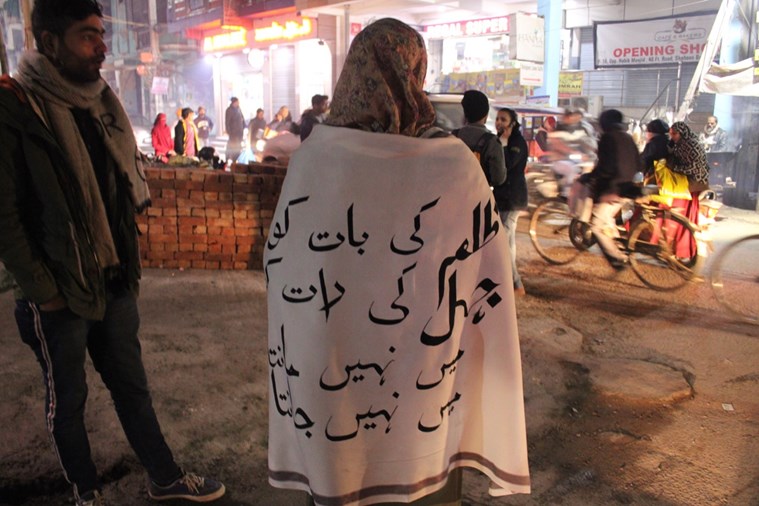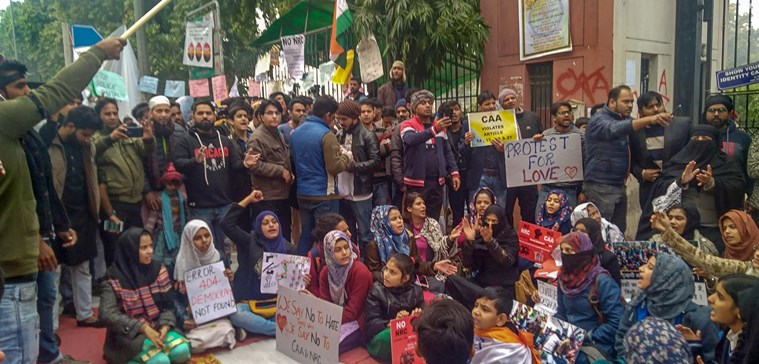Habib Jalib Poetry in English
 Habib Ahmed — who took 'Jalib' as pen name after Urdu poet Jalib Dehlvi — was born in East Punjab's Hoshiarpur district in 1928.
Habib Ahmed — who took 'Jalib' as pen name after Urdu poet Jalib Dehlvi — was born in East Punjab's Hoshiarpur district in 1928.
At New Delhi's Shaheen Bagh, where hundreds of women are on a sit-in against the CAA and NRC for over a fortnight now, Shashibhushan Samad of the Jawaharlal Nehru University (JNU) wasn't allowed to leave the dais without singing Dastoor last week. Samad's recital of the Pakistani poet's poem on the steps of JNU, when the university students were protesting a hike in hostel fee among other things, had gone viral months ago. And ever since, the powerful critique of the anti-poor constitution, introduced in the regime of Pakistan's first military dictator General Ayub Khan, has found much resonance on this side of the border. It is ironic but it is mostly Pakistani poets – Faiz Ahmed Faiz, Jalib, and Allama Iqbal — whose language of resistance and dissent are inspiring the youth protesting against the Citizenship (Amendment) Act across the country.
In 1962, Ayub Khan's constitution enforced in Pakistan an indirect election of an executive president through an electoral college, instead of direct democracy. Calling out the farce, Jalib wrote Dastoor in response, which adequately vented the political frustration of the ordinary Pakistani. The poet sang it openly, at various public gatherings and stages. The poem attained the status of an anthem, and very often people would join Jalib when he recited it.
 Zulm ki baat ko, jahl kī raat ko/ Main nahin maanta, main nahin jaanta: A protester at New Delhi's Shaheen Bagh.
Zulm ki baat ko, jahl kī raat ko/ Main nahin maanta, main nahin jaanta: A protester at New Delhi's Shaheen Bagh.
Dastoor is now being sung by the youth in India, and its verses – Aise dastoor ko, Subhe-be-noor ko/ Main nahin maanta, Main nahin jaanta (This system, this morning bereft of light/ I refuse to accept, I refuse to acknowledge) — are being flashed on posters. Significantly, while Dastoor has often featured at mushairas in India, it is perhaps for the first time that it has become such a big part of the popular protests here.
Poet Gauhar Raza says: "Of course, we always knew Jalib and his Dastoor and loved both. But I haven't seen Dastoor being used in earlier protests or even during the Emergency. It is after 2014 that Jalib's works are quoted more and more. Dastoor's popularity has touched a high during these protests and Indian protesters are celebrating it like never before."
Adds Raza: "In Dastoor, which means the system or the structure, Jalib is rejecting that country's constitution. Such poetries of resistance become popular in times of the rise of fascism, as it happened in Pakistan, Germany, Latin America, and, now in India. A similar kind of oppression has been unleashed in India. Much like Jalib, the youth and the common people here are fighting for the constitution. It will not let the government violate it. In Dastoor's words and imageries, they find apt expressions for their angst."
Samad concurs: "Dastoor mein woh saari baatein hain jinko nahin maanna chahiye (Dastoor tells about all those things that one should reject). It is not surprising that an inquilabi (revolutionary) poem like this has become popular in these times of fascism. Jalib went to jail for writing this, people who are reciting him face that risk now."
Habib Ahmed — who took Jalib as pen name after Urdu poet Jalib Dehlvi — was born in East Punjab's Hoshiarpur district in 1928. He did his schooling in Delhi. His early writings were about romance and nature. At the time of Partition, a young Jalib moved to Pakistan and found a job as the proof-reader of Urdu newspaper Imroze in Karachi whose editor was Faiz Ahmed Faiz. His interactions with Faiz made a huge impact on him and he soon moved towards the ideological Left and became a member of the Communist Party of Pakistan and the Progressive Writers' Movement.
In 1959, Jalib was growing increasingly restless with the state of affairs in Pakistan that was a year into the military regime of Ayub Khan. That year, at a mushaira aired live from the Rawalpindi studio of Pakistan Broadcasting Corporation, Jalib, unlike other poets, chose to speak the truth. "Kahin gas ka dhuan hai, kahin golion ki baarish / Shab-e-ahd-e- kamnigahein/tumhein ye kis tarah sarhaeein (Here, the stench of teargas, There, a hail of bullets/ In the night of the era of such shortsightedness/ how can I praise you?)," he said.
Jalib's defiant voice reverberated in Pakistan, leaving the Army and the common people shocked. The programme was taken off the air and the poet arrested for the first time – many more jail stints were to follow under various regimes, both military and democratic, each time for writing "inflammatory" poetry, including for famously reading Dastoor during a public rally at Lahore's Mochi Gate.
 Students at a demonstration against the Citizenship Amendment Act (CAA) outside Jamia Milia Islamia University. (PTI file)
Students at a demonstration against the Citizenship Amendment Act (CAA) outside Jamia Milia Islamia University. (PTI file)
In 1965, when the Shah of Iran Mohammed Reza Pahlavi was in Pakistan, the then Governor of West Pakistan asked film actress Neelo to dance before the Shah. She refused and the police was sent to arrest her. The actor resisted and is said to have attempted suicide. Jalib wrote a poem in her honour — Too ke nawaqif-i-aadab-i-shahenshahi hai abhi/ Raqs zanjeer pehen kar bhee kiya jata hai (You are unaware of the tenets of imperialism/ You can also dance in chains). The poem would go on to become a famous movie song sung by none other than the legendary Mehdi Hassan.
In yet another example of Jalib's audacity and activism, the poet had publicly declared before a portrait of General Yahya Khan who had succeeded General Ayub Khan: Tum se pehle jo aik shaḳhs yahan takht nasheen tha/us ko bhi apne khuda hone pe itna hi yaqeen tha (The one who was enthroned before you/ He too was convinced he was God).
During the Zia-ul-Haq era, he wrote a 'welcome' song: Sar sar ko saba, zulmat ko Zia/ bande ko khuda kya likhna (How can I describe darkness as light, a storm as a zephyr or a man as God?). Jalib supported Benazir Bhutto in her struggle against Zia and wrote: Darte hain bandooq wale ek nihatthi ladki se (Those with guns fear an unarmed girl).
ALSO READ |'Kisi ke baap ka Hindustan thodi hai': Rahat Indori's line from three decades ago is rallying call
Gauhar Raza, who had hosted Jalib in Delhi in the 80s, underlines that the poet was witty and a fantastic raconteur. Raza recalls an anecdote shared by Jalib himself. "Jalib loved drinking, which is a criminal offence in Pakistan. Police would always be on the lookout to arrest him. During the Zia era, he was caught on charges of drinking while he was with a Maulana in a car. The police took them to the police station where their urine was sent for tests. The poet said he had exchanged his urine with the Maulana's, and since the latter was much respected, the police could do nothing."
Raza says Jalib remained incorruptible and committed to the people all his life. He passed away in 1993. In an interview, Jalib had said: "There are two kinds of audiences: the Establishment and the people. I am a people's poet (Awam-e-Shayar) and proud of it."
📣 The Indian Express is now on Telegram. Click here to join our channel (@indianexpress) and stay updated with the latest headlines
Source: https://indianexpress.com/article/lifestyle/art-and-culture/habib-jalib-his-dastoor-why-the-peoples-poet-and-his-verse-are-inspiring-indias-youth-6194746/